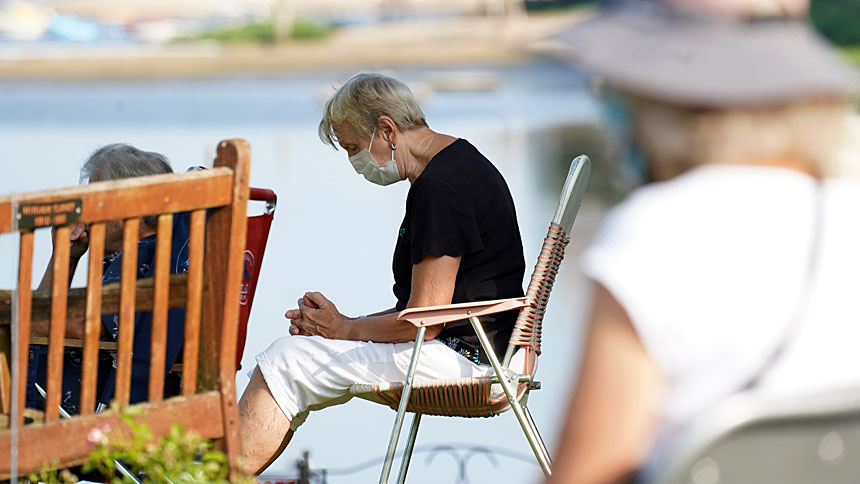
CNS photo/Gregory A. Shemitz
Summer is usually a lot of fun in our homes. The elderly enjoy getting outdoors for picnics, gardening and community outings, especially when they include a stop for ice cream.
Not so this year! As summer wears on with no end to the pandemic in sight, the mandated social isolation is beginning to take a serious toll on our elderly residents.
In many of our homes, the residents have been living in forced isolation in their rooms since late March. Direct contact with family and friends has been forbidden for the last five months. While people from many walks of life have been incredibly generous in sending messages to our residents and helping us to provide for their physical needs, and we have been able to use technology to ensure screen contact between the elderly and their loved ones, screen time cannot fully replace person-to-person connections with loved ones and socialization with fellow residents.
The longer the pandemic lasts, the more concerned I am about the isolation of the elderly. It’s bad enough for our residents, but I can’t even begin to imagine how lonely it is for seniors who live by themselves, especially in rural areas and regions that lack adequate internet service – an estimated half of all Americans lack high-speed internet service at home – or for those unfamiliar with communication technologies many of us take for granted.
Since the beginning of the pandemic celebrities of all types have reached out online to lift our spirits and remind people that we are all in this together. “Alone together” has become a popular catch-phrase, but what about the 50 percent of Americans – including many seniors – who lack internet access and who are especially vulnerable to the scourge of loneliness?
I’m afraid that the marginalization of frail seniors could become the new normal. A recent study carried out by the National Bureau of Economic Research (NBER) suggests that both economic damages and loss of life from COVID-19 might best be limited by “a simple targeted policy that applies an aggressive lockdown on the oldest group and treats the rest of the population uniformly.”
The NBER working paper (May 2020) states that gains from “targeted policies” can be substantially increased by combining them with additional measures such as increasing the “social distance” between the oldest group and the rest of the population, reducing visits to older relatives and segregating the times when different demographic groups can go to grocery stores and pharmacies.
Such measures are referred to as a form of “protective custody” intended to protect the elderly.
After seeing our residents suffer through five months of lockdown, concepts such as “targeted policies” and “protective custody” make me cringe. Surely our society can do better than this for our seniors!
Feeling the weight of these issues, I happened upon a recent tweet of Pope Francis. “The COVID-19 pandemic has revealed that our societies have not organized enough to make room for the elderly, with just respect for their dignity and fragility. Where you don’t care for the elderly, there’s no future for the young,” he wrote.
And then I read our Holy Father’s message to young people on July 26, the feast of Sts. Joachim and Anne, the grandparents of Jesus. He asked the young to perform “a gesture of tenderness towards the elderly, especially the loneliest, in their homes and residences, those who have not seen their loved ones for many months.”
“Dear young people,” he said, “each one of these elderly people is your grandparent! Do not leave them by themselves. Use the inventiveness of love, make telephone calls, video calls, send messages, listen to them and, where possible, in compliance with the healthcare rules, go to visit them too. Send them a hug.”
Taking up our Holy Father’s challenge, the Vatican Dicastery for Laity, Family and Life has launched a campaign entitled “The elderly are your grandparents.” It invites young people to be inventive and do something concrete for older people who are vulnerable to loneliness. The campaign is associated with the hashtag #sendyourhug.
Let’s evaluate our own attitudes and behaviors during this difficult time, asking ourselves if we are sensitive to how our actions might adversely affect the wellbeing of others, and if we could do more to safely reach to the most vulnerable.
Let’s get inventive and find ways to make sure that our elders never feel marginalized or forgotten, no matter how long the pandemic lasts!
Sister Constance Veit is the director of communications for the Little Sisters of the Poor.

